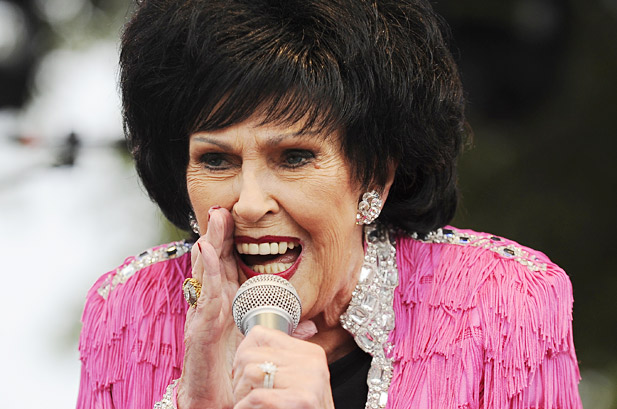
This past August I caught the legendary Wanda Jackson performing at Austin’s Continental Club. It was a memorable show, but it left me with mixed feelings about her legacy and popular culture’s general lack of interest in female musicians once they reach “a certain age.” This is probably why it has taken me well over two months to write about the experience. Conveniently, yesterday was Jackson’s birthday. She turned 77.
Known as the “Queen of Rockabilly,” Jackson rose to fame in the late 1950s as a kind of female version of Elvis Presley. In fact, she and Elvis toured together and even dated for a time. She gives him credit for convincing her to leave the honky-tonk music she grew up singing in California and Oklahoma for the rockabilly songs that would eventually land her a spot in the Rock and Roll Hall of Fame (she was inducted in 2009).
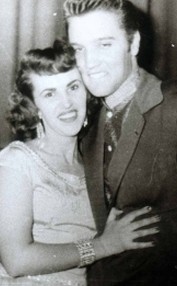
Wanda & Elvis (c. 1956)
The most successful rockabilly performers tended to be men (Elvis, Cash, etc.). Jackson did not ever top them in radio play or record sales, but in her songs she found the room to put their masculinist worldview in its place. “I Gotta Know” (1956), for example, pokes fun at Elvis’s dancing, with the narrator complaining that “[w]hen you’re on that floor you’re cool man cool, but when it comes to loving you need to go to school.”
Furthermore, in songs like “Fujiyama Mama” (1957) and “Riot in Cell Block #9” (1960), she brings into plain view the topic of female sexuality, which the male rockabillies avoided. In these songs, sexual desire is a dangerous and unsettling force–powerful as an atomic bomb or a prisoners’ revolt. In “Riot,” she describes female inmates overpowering their guards and cat-calling the male militia members who are sent in to calm them down. The song had been a hit for the Robins–an all-male R&B band–in 1954, but when Jackson performed it, it became a kind of transgressive, feminist response to Elvis’s “Jailhouse Rock” (1957).
In the 1960s, rockabilly began losing its commercial appeal and Jackson moved back into country (and later, gospel) music. In songs like “The Box It Came In” (1966) and “My Big Iron Skillet” (1969), she continued criticizing philandering men, even threatening them with violence. But her bigger hits from this period were more often about heartbreak and standing by your man whether he’s right or wrong, which makes it hard to argue that there is any kind of feminist message unifying her many, many records. Colin Escot, in the book accompanying Bear Family’s 8-CD collection of her country recordings, chalks this up to Jackson’s never having the kind of major hit that would bring her the power to choose the best new songs. In a sense, she made a career making the best she could of the leftovers.
 On one hand, the Continental Club is a perfect place for Jackson to perform. Open since 1957, it has hosted some of the United States’s greatest musicians, from Tommy Dorsey to Stevie Ray Vaughan. The owner, Steve Wertheimer, has honored Jackson with tribute shows, and she clearly feels at home there. The performance I attended lasted a little over an hour, which was understandable given her age and that there were 2-3 other acts also playing that night. She was surprisingly energetic, shrieking into the mic like a crazed inmate at one point and later yodeling her way through “I Betcha My Heart I Love You.”
On one hand, the Continental Club is a perfect place for Jackson to perform. Open since 1957, it has hosted some of the United States’s greatest musicians, from Tommy Dorsey to Stevie Ray Vaughan. The owner, Steve Wertheimer, has honored Jackson with tribute shows, and she clearly feels at home there. The performance I attended lasted a little over an hour, which was understandable given her age and that there were 2-3 other acts also playing that night. She was surprisingly energetic, shrieking into the mic like a crazed inmate at one point and later yodeling her way through “I Betcha My Heart I Love You.”
But on the other hand, I couldn’t help but think that after rocking for six decades the Queen of Rockabilly should be playing someplace a little nicer–someplace where the audience has sense enough to shut up when she talks about grabbing sodas on her dates with Elvis Presley. For all its history, the Continental Club is a little shabby around the edges and is exactly the sort of place Jackson must have had in mind when she admitted to Escot that she wished she didn’t have to play honky tonks anymore. I would think that Wanda fucking Jackson wouldn’t have to play anywhere she didn’t want to anymore.
 My dad is a huge country music fan and I think he has passed that down to me. Whenever my dad and I talk about country music he always talk about his favorite artist, Willie Nelson. I learned so much about Willie Nelson from my dad. Even though my dad was born and raised in Bosnia, Willie Nelson was no stranger to him. My dad grew up in many foster homes so music was really the only thing he had. He told me a story of how someone one day dropped off a box at his foster home, filled with different cassettes and records. My dad never really had anything so when people brought in freebies, he was always the first one to go and look in the box. That day he came across a Willie Nelson record. Still to this day he has this Willie Nelson record.
My dad is a huge country music fan and I think he has passed that down to me. Whenever my dad and I talk about country music he always talk about his favorite artist, Willie Nelson. I learned so much about Willie Nelson from my dad. Even though my dad was born and raised in Bosnia, Willie Nelson was no stranger to him. My dad grew up in many foster homes so music was really the only thing he had. He told me a story of how someone one day dropped off a box at his foster home, filled with different cassettes and records. My dad never really had anything so when people brought in freebies, he was always the first one to go and look in the box. That day he came across a Willie Nelson record. Still to this day he has this Willie Nelson record. I made the mistake one day and asked my dad where he got this record from because what I thought was going to be a simple answer turned into a two hour story. My dad told me that from the day he laid hands on this record, he knew that country music would be an important thing in his life. When I was little my dad would always play Willie Nelson songs and we would talk about what these songs meant to him. I would always ask my dad what his favorite Willie Nelson songs was and he would always tell me, “I don’t have one.” It was hard for him to pick a favorite because he said Willie Nelson had so many great hits. I learned so much from my dad while growing up but learning to share his love for country music was one of the greatest. Even though I may not be a little girl anymore, my dad and I still sit around some days and listen to country music together. Country music is one of the many things that we have in common. I love my dad and I am so glad we can experience our love for country music together.
I made the mistake one day and asked my dad where he got this record from because what I thought was going to be a simple answer turned into a two hour story. My dad told me that from the day he laid hands on this record, he knew that country music would be an important thing in his life. When I was little my dad would always play Willie Nelson songs and we would talk about what these songs meant to him. I would always ask my dad what his favorite Willie Nelson songs was and he would always tell me, “I don’t have one.” It was hard for him to pick a favorite because he said Willie Nelson had so many great hits. I learned so much from my dad while growing up but learning to share his love for country music was one of the greatest. Even though I may not be a little girl anymore, my dad and I still sit around some days and listen to country music together. Country music is one of the many things that we have in common. I love my dad and I am so glad we can experience our love for country music together.

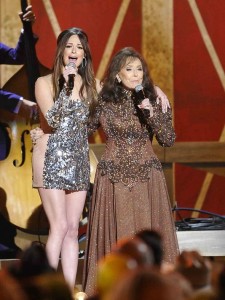 The best part of the performance, in my opinion, is looking at the audience’s reaction. The second Lynn came on stage, everyone in the building was on their feet with a round of applause that could bring any performer to tears. The duo finished out the sound, harmonizing perfectly and standing side by side with their arms around each other. The audience was going crazy, and I think this could be attributed to the possibility that seeing Loretta Lynn on stage was very unexpected.
The best part of the performance, in my opinion, is looking at the audience’s reaction. The second Lynn came on stage, everyone in the building was on their feet with a round of applause that could bring any performer to tears. The duo finished out the sound, harmonizing perfectly and standing side by side with their arms around each other. The audience was going crazy, and I think this could be attributed to the possibility that seeing Loretta Lynn on stage was very unexpected.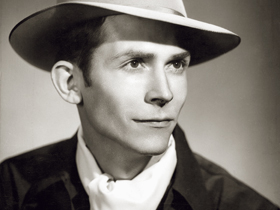

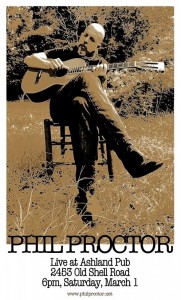
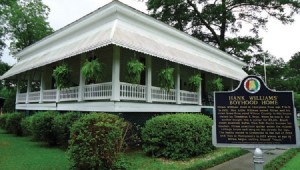 Hank’s family eventually moved out of this house in 1937 and relocated to Montgomery, Alabama. Even though Hank lived in multiple houses growing up, this home in Georgiana is specifically known to be where his musical success started to take off. Hank Williams died of a heart attack on January 1st, 1953 in the back of a Cadillac. When they found him, he was accompanied with empty beer cans and half written lyrics. I never really realized the influence Hank Williams had on country music before I took this class. His impact on country music has grown since his early death at the age of 29. Artists such as Bob Dylan, Norah Jones, and Dinah Washington have all done covers of his work. His son, Hank Williams Jr., has also done covers of his fathers songs, and also has made a name for himself in the country music industry. In 1961 he was inducted into the Country Music Hall of fame, and in 1985 inducted into the Alabama music hall of fame. I hope this blog has helped you learn a little more about Alabama Native Hank Williams, let me know what ya’ll think!
Hank’s family eventually moved out of this house in 1937 and relocated to Montgomery, Alabama. Even though Hank lived in multiple houses growing up, this home in Georgiana is specifically known to be where his musical success started to take off. Hank Williams died of a heart attack on January 1st, 1953 in the back of a Cadillac. When they found him, he was accompanied with empty beer cans and half written lyrics. I never really realized the influence Hank Williams had on country music before I took this class. His impact on country music has grown since his early death at the age of 29. Artists such as Bob Dylan, Norah Jones, and Dinah Washington have all done covers of his work. His son, Hank Williams Jr., has also done covers of his fathers songs, and also has made a name for himself in the country music industry. In 1961 he was inducted into the Country Music Hall of fame, and in 1985 inducted into the Alabama music hall of fame. I hope this blog has helped you learn a little more about Alabama Native Hank Williams, let me know what ya’ll think!

